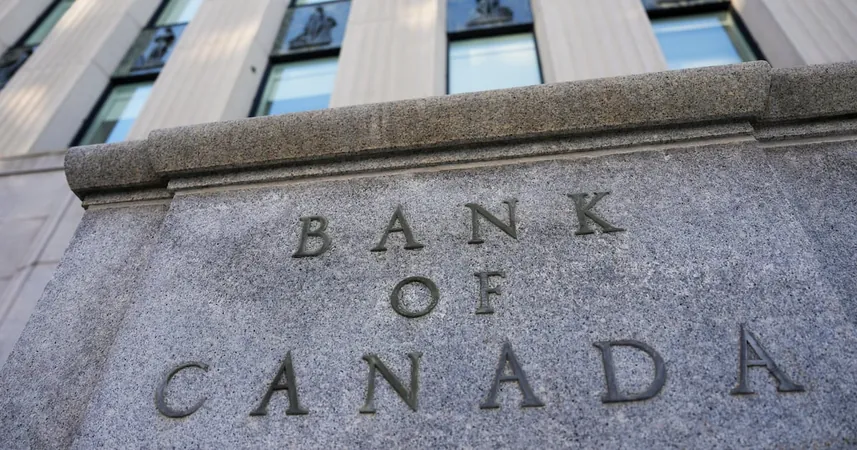
Canada's Central Bank Weighs Interest Rate Pause Amid Market Turbulence
2025-04-14
Author: Michael
Bank of Canada Faces Tough Decision on Interest Rates
The Bank of Canada is on the verge of a critical decision this week, leaning toward a pause in its ongoing interest rate cuts. This shift comes as inflation rises and U.S. President Donald Trump's wavering stance on tariffs reduces the immediate need for economic stimulus.
Current market analytics indicate a 58% likelihood of the Bank opting for a pause in interest rates, a significant reversal from just a few days ago when expectations strongly pointed toward a cut. This flip-flopping in market sentiment highlights the unpredictable nature of economic forecasts as Trump oscillates between imposing and retracting tariffs.
A Rollercoaster of Expectations
Economic analysts have been scrambling to adjust their predictions, with many experts torn between the possibility of a rate cut and the safer bet of a pause. Tony Stillo, an economist at Oxford Economics, explained, "They (the Bank) want to maintain some buffer or 'dry powder' should the economy enter a recession, suggesting a pause may be the preferred route."
In the last ten months, the central bank has lowered its key borrowing rate by a total of 225 basis points to 2.75%. This position now sits squarely in the neutral range—balancing between stimulating and constraining economic growth. If the Bank decides to hold off on cutting rates, it will mark the first instance of this since June, following one of the most aggressive rate reduction campaigns among major global central banks.
Announcement Ahead: What to Expect
BoC Governor Tiff Macklem is set to reveal the council’s decision on Wednesday at 9:45 a.m. ET, alongside a quarterly monetary policy report. This will be the first time since the pandemic that the Bank will present a range of economic forecasts instead of a single prediction, due to the murky economic landscape.
Trade Uncertainty Looms
Trump's indecision regarding tariffs has rattled markets and dampened both business and consumer spending. David Doyle, an economist at Macquarie Group, remarked, "If this uncertainty lingers, the recession in Canada we anticipated back in March could worsen significantly." He pointed out that pressures stemming from recent inflation spikes could force the Bank to reconsider its plans.
Inflation and Job Losses Raise Red Flags
February saw inflation soar to an eight-month high of 2.6%, alarming analysts who worry about the implications for continued rate cuts. Coupled with the unexpected loss of 32,600 jobs in March—the first decline in three years—these factors are creating a more complicated and uncertain outlook for monetary policy.
Doyle concluded, "The situation is increasingly complex due to the ongoing trade war and fluctuating inflation data, which are clouding the prospects for rate cuts." The Bank's next moves will be pivotal not just for Canada, but for the broader economic landscape.









 Brasil (PT)
Brasil (PT)
 Canada (EN)
Canada (EN)
 Chile (ES)
Chile (ES)
 Česko (CS)
Česko (CS)
 대한민국 (KO)
대한민국 (KO)
 España (ES)
España (ES)
 France (FR)
France (FR)
 Hong Kong (EN)
Hong Kong (EN)
 Italia (IT)
Italia (IT)
 日本 (JA)
日本 (JA)
 Magyarország (HU)
Magyarország (HU)
 Norge (NO)
Norge (NO)
 Polska (PL)
Polska (PL)
 Schweiz (DE)
Schweiz (DE)
 Singapore (EN)
Singapore (EN)
 Sverige (SV)
Sverige (SV)
 Suomi (FI)
Suomi (FI)
 Türkiye (TR)
Türkiye (TR)
 الإمارات العربية المتحدة (AR)
الإمارات العربية المتحدة (AR)